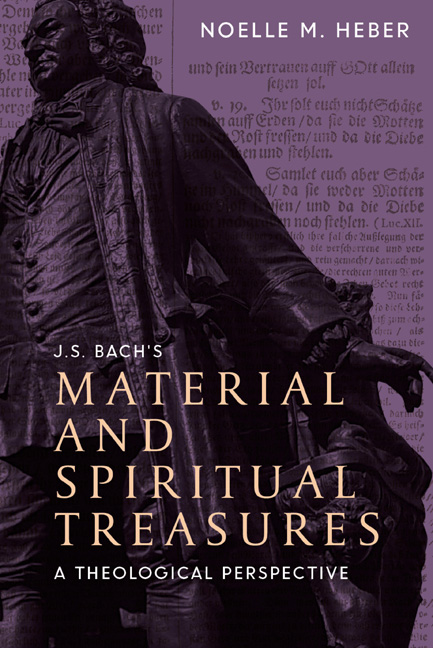Book contents
- Frontmatter
- Dedication
- Contents
- List of Illustrations
- List of Music Examples
- Foreword
- Preface
- List of Abbreviations
- Introduction
- 1 Bach’s Material Treasures: Career, Salary, and Freelancing
- 2 The Servant Prince: Poverty of Christ: Three Days of Christmas (BWV 91, 197a, 248/I, 121, 151)
- 3 Mammon’s Chain: The Destructive and Redemptive Potentials of Material Wealth: Ninth Sunday after Trinity (BWV 105, 94, 168)
- 4 The Afflicted Shall Eat: Tables Are Turned in Eternity: First Sunday after Trinity (BWV 75, 20, 39)
- 5 Spiritual Manna: The Lord Embraces the Poor: Seventh Sunday after Trinity (BWV 186, 187)
- 6 ‘Blood Money’: The Coins that Bought Jesus’ Death: Good Friday (St Matthew Passion)
- 7 Bach’s Spiritual Treasures: Values and Priorities
- Bibliography
- Index of Biblical References
- General Index
6 - ‘Blood Money’: The Coins that Bought Jesus’ Death: Good Friday (St Matthew Passion)
Published online by Cambridge University Press: 27 March 2021
- Frontmatter
- Dedication
- Contents
- List of Illustrations
- List of Music Examples
- Foreword
- Preface
- List of Abbreviations
- Introduction
- 1 Bach’s Material Treasures: Career, Salary, and Freelancing
- 2 The Servant Prince: Poverty of Christ: Three Days of Christmas (BWV 91, 197a, 248/I, 121, 151)
- 3 Mammon’s Chain: The Destructive and Redemptive Potentials of Material Wealth: Ninth Sunday after Trinity (BWV 105, 94, 168)
- 4 The Afflicted Shall Eat: Tables Are Turned in Eternity: First Sunday after Trinity (BWV 75, 20, 39)
- 5 Spiritual Manna: The Lord Embraces the Poor: Seventh Sunday after Trinity (BWV 186, 187)
- 6 ‘Blood Money’: The Coins that Bought Jesus’ Death: Good Friday (St Matthew Passion)
- 7 Bach’s Spiritual Treasures: Values and Priorities
- Bibliography
- Index of Biblical References
- General Index
Summary
Was bekummert ihr das Weib? Sie hat ein gut Werck an mir gethan. Ihr habet allezeit Armen bey euch; mich aber habt ihr nicht allezeit.
Matthaus 26.10b–11THE Lutheran thought explored in this book has shown that Jesus was born in poverty, taught important lessons about material and spiritual treasures during his lifetime, and that his heart breaks for the physical and non-physical needs of humanity. It was likewise his ‘heart of love’ that compelled Jesus to die, a defining moment in the inception of Christianity. Christ's death also stands at the crux of Lutheran theology's emphasis on justification, opening a pathway for sinners to be reconciled to God and receive eternal life. Considering that Bach wrote his most extensive compositions for Good Friday, we may assume that he likewise found a particular significance in this event. After all, while it was common to compose Passion Oratorios at the time, there was no obligation for Bach to create any such works, especially of this magnitude.
Reciting the story of the passion of Christ on Good Friday had been a church tradition as early as the fourth century, but it only began to be set to music in the fifteenth century and then further developed into motet and dramatic musical passions. Bach's Passions surpassed those of his predecessors in terms of compositional grandeur and musical complexity. The St Matthew Passion, which debuted on Good Friday, 11 April 1727, is today one of Bach's most well-known and often-performed works, widely appreciated for its aesthetic appeal and continually cherished by some modern Christians for its spiritual significance.
The narrative of the story recounted in Bach's St Matthew Passion is taken verbatim from Matthew 26 and 27 in the Luther Bible. This biblical account opens two days before the Passover as Jesus informs his disciples that he will be crucified. It continues with reports of a plot to kill Jesus, a woman anointing him in Bethany, the Passover and Last Supper with his disciples, Jesus praying in Gethsemane, Judas betraying Jesus, his arrest and trial, Peter's denial that he was a disciple of Jesus, Judas’ repentance and suicide, Jesus delivered to be crucified, the crucifixion, death, and burial of Jesus, and, finally, Pilate's instructions to the chief priests and Pharisees to secure and guard Christ's tomb.
- Type
- Chapter
- Information
- J. S. Bach's Material and Spiritual TreasuresA Theological Perspective, pp. 177 - 208Publisher: Boydell & BrewerPrint publication year: 2021



